Building Credit Without a Credit Card
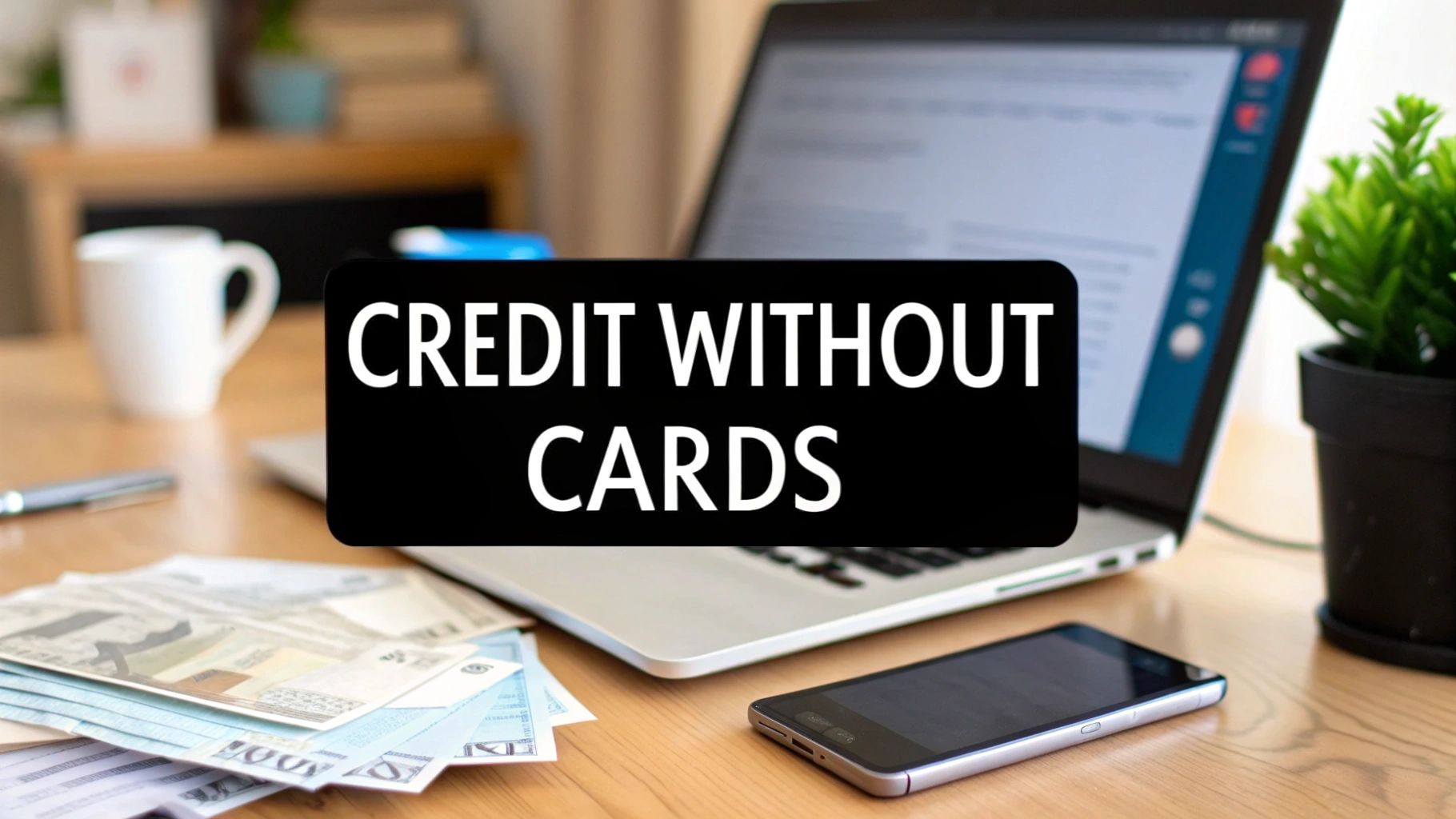
Think you need a credit card to build a solid credit history? That’s one of the biggest myths out there, and it’s a trap that keeps many people, especially ITIN holders, from getting started.
The good news is that you absolutely can build credit without a credit card. By using smart alternatives like credit-builder loans, rent reporting services, and even certain secured loans, you can prove your financial reliability. These tools work by reporting your on-time payments to the major credit bureaus, building a positive history without the risks of revolving debt.
Why You Don't Need a Credit Card to Build Credit
It’s a classic catch-22: you need credit history to get a credit card, but you're told you need a credit card to build a history. This frustrating loop is a major hurdle for anyone new to the U.S. financial system.
This isn’t just a minor inconvenience; it's a massive global issue. The World Bank estimates that a staggering 1.4 billion people worldwide are "unbanked," meaning they lack the formal financial records that lenders typically look for. This systemic barrier can feel impossible to overcome, but thankfully, there are smarter ways to prove your creditworthiness.
At the end of the day, credit bureaus are interested in one thing: proof of consistent, timely payments. It doesn't really matter if that payment is for a credit card bill, a small installment loan, or your monthly rent. The responsible behavior is what builds your score.
Your Path to a Stronger Credit Score
This is where alternative credit-building methods really shine. They're designed to report the good financial habits you already have.
Think about it—you pay your rent every month, right? That’s a perfect example of financial responsibility. A rent reporting service takes that existing payment history and makes it visible to the credit bureaus, turning a monthly expense into a credit-building asset.
This decision tree shows the two primary paths you can take to establish your financial reputation.
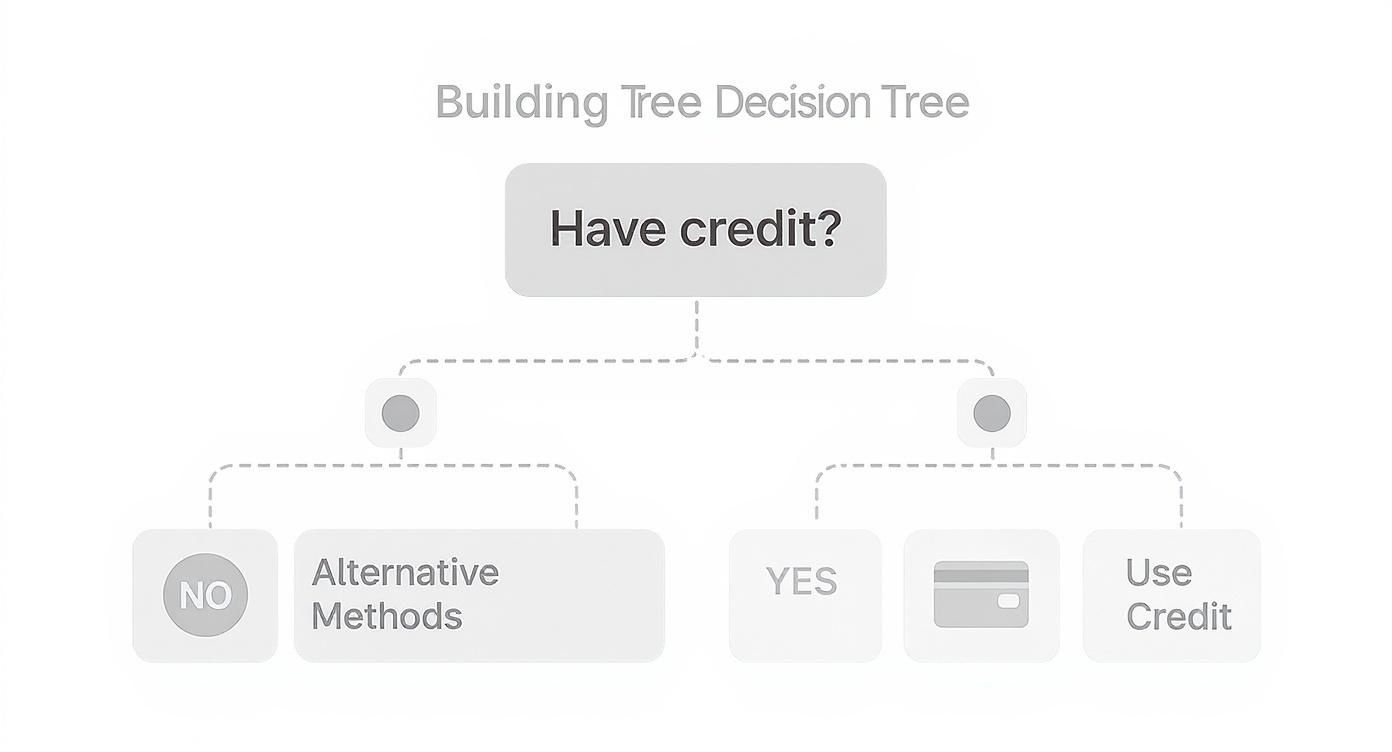
The takeaway is simple: not having a traditional credit history doesn't mean you're at a disadvantage. It just means you start on a different, equally effective path toward financial stability.
Real-World Success Stories
Let's look at a common scenario. Imagine a self-employed ITIN holder who prefers to avoid credit cards to keep a tight rein on their budget. They decide to open a small, $500 credit-builder loan with their local credit union.
For the next year, they make small, fixed monthly payments. Each and every one of those payments gets reported to Equifax, Experian, and TransUnion. After 12 months, the loan is paid off, they get their original $500 back, and more importantly, they now have a positive payment history and a real credit score.
This new score can open doors to better rates on a future car loan or even a mortgage—all accomplished without a single credit card.
Credit Card vs Alternative Credit Building Methods
While credit cards are the most well-known tool, it's helpful to see how they stack up against these alternative methods. Each path has its own mechanics, risks, and benefits.
Ultimately, both paths can lead to a strong credit score. However, for many ITIN holders just starting out, the alternative methods provide a more controlled, lower-risk, and accessible entry point into the U.S. credit system.
Use Strategic Loans to Establish Your Credit History
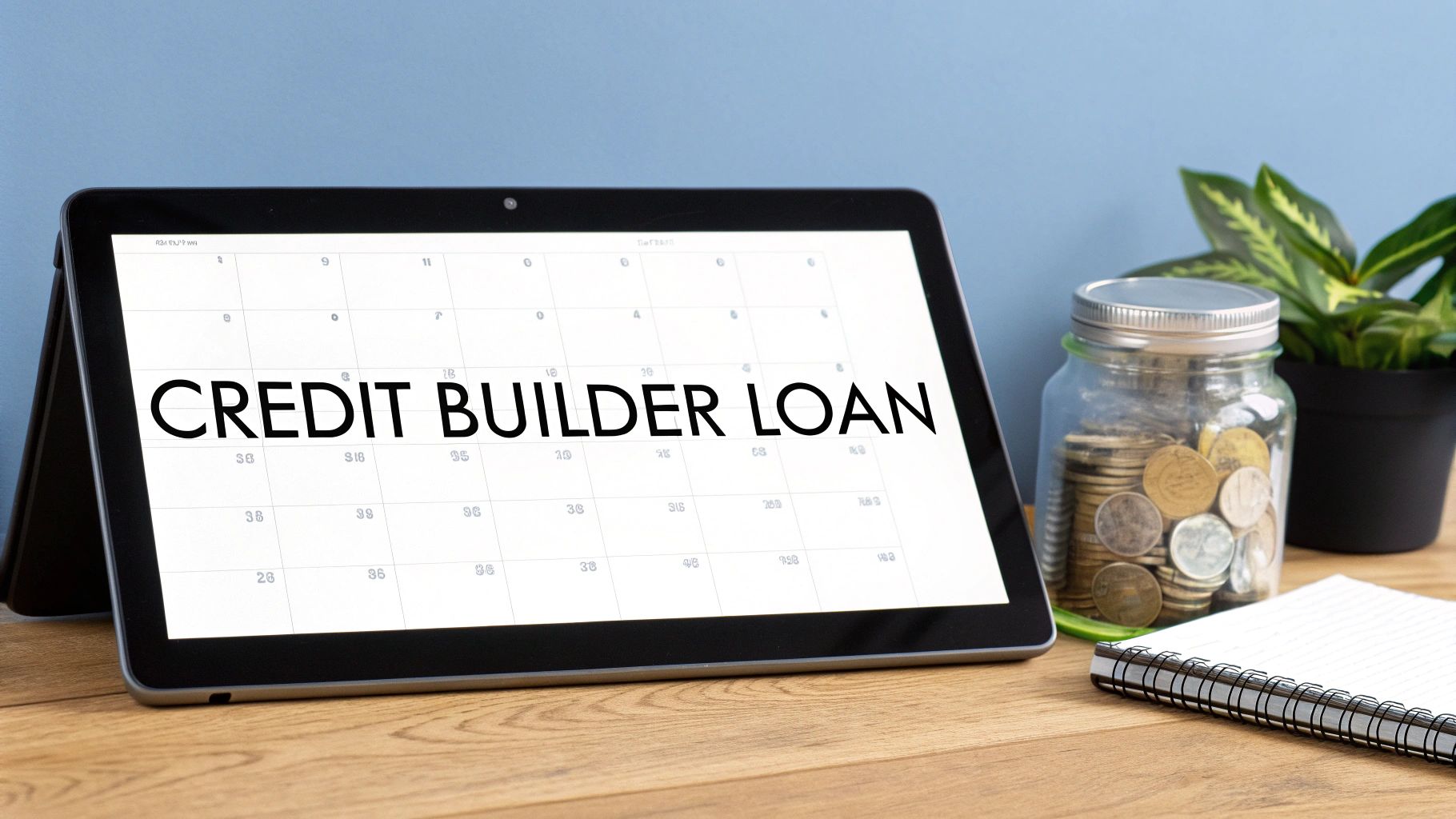
If you're steering clear of credit cards, you can still put the lending system to work for you. The key is to use loans that are specifically designed to build a positive payment history. These aren't your typical high-stakes loans; think of them as structured, low-risk tools meant to prove your financial reliability to the credit bureaus.
One of the best tools for this job is a credit-builder loan. It’s a fascinating product because it works in reverse. Instead of getting cash upfront, the lender puts the loan amount—usually somewhere between 300** and **1,500—into a locked savings account that you can’t access.
You then make small, fixed monthly payments over a period of 6 to 24 months. Every single on-time payment gets reported to the major credit bureaus. After you've made all the payments, the lender releases the full amount to you, sometimes with a little interest you've earned. It's a brilliant way to force yourself to save while building a solid credit profile.
Finding the Right Credit-Builder Loan
So, where do you find one? I always tell people to start with local credit unions and community banks. They often have programs specifically for people who are new to the U.S. financial system. You’ll also find plenty of great options from online lenders and fintech companies, which can be an easy entry point.
Before you sign on the dotted line, make sure you fully grasp the loan's structure and how your payments will build your financial future. If you want to dig deeper, our guide on finding the best loan to help build credit is a great resource.
Other Loan Options to Consider
Credit-builder loans are fantastic, but they aren't your only option. A couple of other strategic choices can also help you establish a strong credit history.
No matter which loan you choose, it’s crucial to know what can affect your balance over time. It's worth your time to review resources on understanding factors that can increase your total loan balance to stay on top of things. When you manage these loans wisely, you're not just making payments—you're creating a powerful record of financial responsibility that will open doors for years to come.
Turn Your Everyday Bills Into Credit-Building Tools
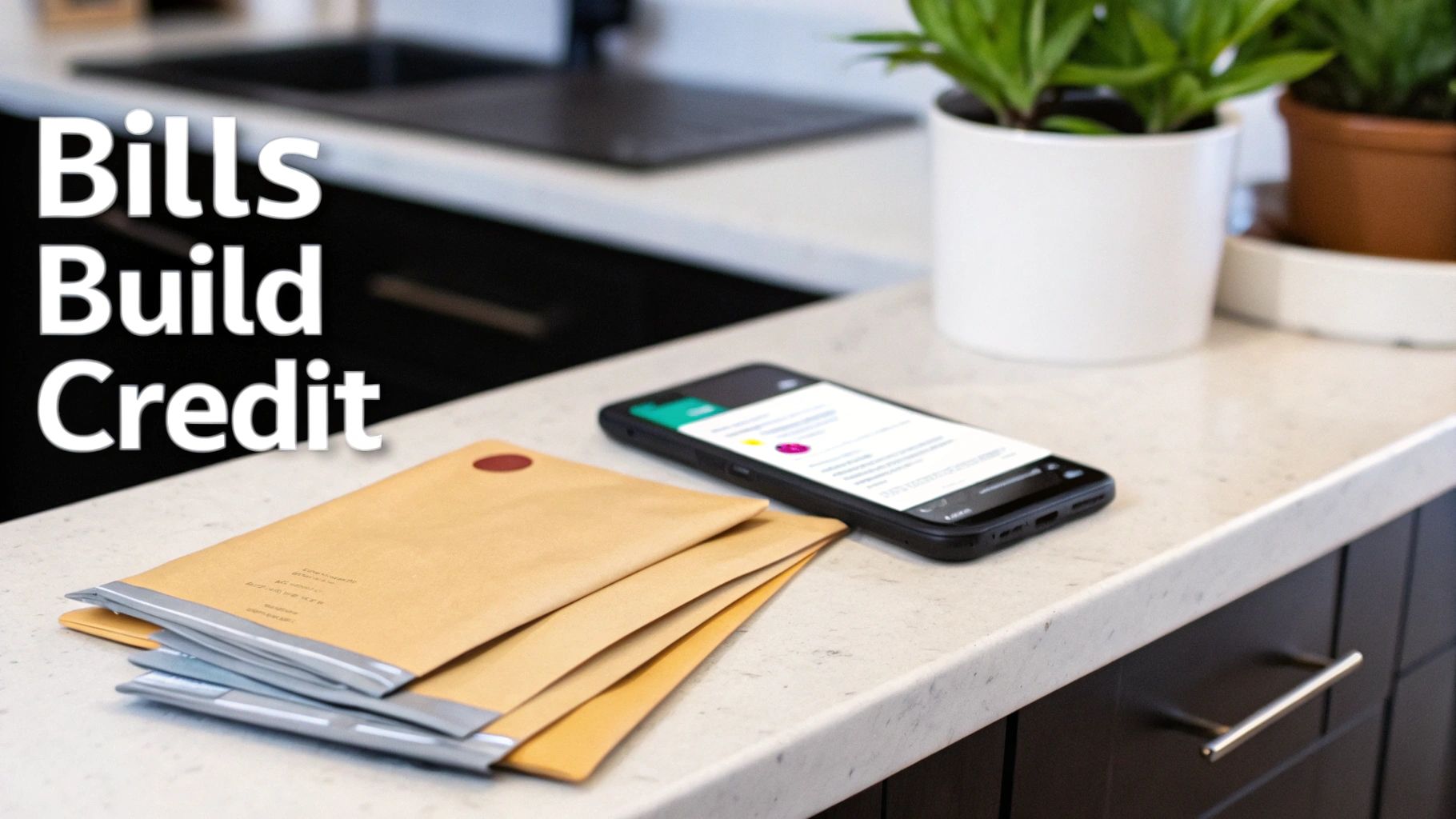
Think about the bills you already pay like clockwork every month—rent, utilities, and even streaming services. For years, these on-time payments went completely unnoticed by the big credit bureaus. Thankfully, that’s no longer the case.
Today, you can transform these routine expenses into powerful tools for building credit without a credit card. A number of services have popped up that capture this positive payment history and report it to the major bureaus. This finally makes your responsible financial habits visible where it counts.
This whole approach is becoming pretty standard, and credit bureaus are now baking this kind of alternative payment data into their scoring models. Programs like Experian Boost and eCredable Lift are designed to report these payments, giving you a chance to build or boost your score based on habits you already have. You can get a much deeper understanding of how these alternative data sources are changing the game by reading about building credit without a card on Experian's blog.
Reporting Your Utility and Streaming Payments
Services like Experian Boost are a fantastic place to start, mainly because they're often free and incredibly easy to get going. All you have to do is connect the bank account you use to pay your bills.
From there, the platform scans your transaction history, looking for those recurring payments you make to qualifying companies. This typically includes:
Once it's linked up, the service reports your history of on-time payments directly to the credit bureau, which can sometimes lead to an immediate score increase. The best part? It only reports positive information. Any late payments are simply ignored, making it a genuinely low-risk strategy.
Leveraging Your Largest Monthly Expense: Rent
For most of us, rent is the single biggest check we write each month. Getting credit for paying it on time can have a huge impact on your credit profile. This is exactly what rent reporting services are designed for.
These platforms work by verifying your rent payments with your landlord and then reporting them as a tradeline on your credit report. Some services are free if your landlord is already partnered with them, while others might charge a small monthly fee.
Successfully building credit without a credit card is all about being strategic. By reporting payments you’re already making, you’re not taking on new debt. You're just getting the recognition you deserve for your existing financial responsibility. It’s the perfect way to turn invisible habits into a visible track record of reliability.
The Power of Becoming an Authorized User
One of the fastest ways to start building credit without a credit card of your own is to become an authorized user on someone else's account. This simply means a trusted family member or friend adds you to their credit card. When they do, the entire history of that card can show up on your credit report.
If the main cardholder has a long track record of paying on time and keeping their balance low, all that positive history can give your credit a serious boost. It's like "piggybacking" on their good financial habits. The best part? You don't even need to use the physical card for this to work. Just being listed on the account is often enough.
This method can be a game-changer because it instantly adds an established account to your report. That can work wonders for factors like the age of your credit history. But be warned—this is a double-edged sword that requires a huge amount of trust.
Navigating the Conversation and Risks
Before you even think about moving forward, you need to have a very open and honest conversation with the person whose account you'd be joining. This isn't just a small favor; it's a financial partnership that affects both of you.
Here's the catch: if the primary cardholder ever misses a payment or lets their balance get too high, that negative information can also land on your credit report. It could torpedo your score before you even get off the ground. That’s why you should only ever consider this with someone you know has rock-solid financial habits. Their credit history essentially becomes a part of yours, for better or for worse.
A Checklist for Choosing the Right Account
To protect yourself, you have to treat this decision like a business arrangement. You need to do your homework on the account before agreeing to anything. Asking a few key questions can save you from a situation that hurts your credit instead of helping it.
Here’s exactly what you need to ask the cardholder:
This whole process directly affects what shows up on your credit report as tradelines. For a deeper look into how these accounts get listed and what they mean, check out our detailed guide on understanding credit report tradelines. By being selective, you can ensure you’re hitching your wagon to a healthy account that will help you build a strong financial foundation.
Explore Modern Fintech Solutions for Credit Building
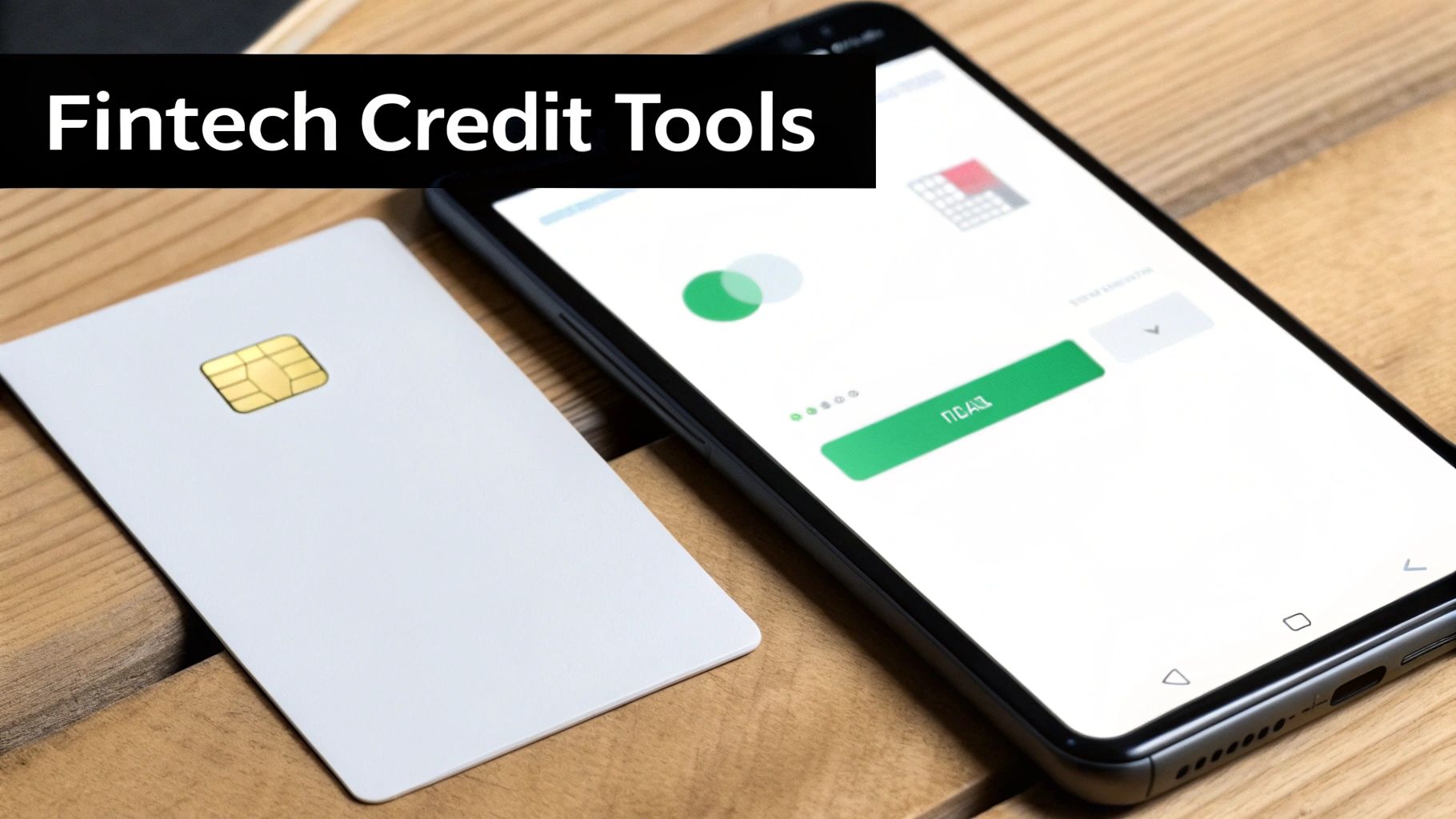
The world of financial technology—fintech, for short—has completely changed the game for anyone looking to build credit without a credit card. New companies are rolling out products designed from the ground up for people who've often been left out by big banks, offering alternatives that are both safer and easier to access.
This is a huge deal. According to research from TransUnion, there are more than 45 million people in the U.S. who are considered "credit unserved or underserved." They just don't have access to the usual credit products. If you want to dive deeper, the full TransUnion research on the credit underserved is a real eye-opener. Fintech companies are filling this gap with tools like interest-free credit-builder cards and small, secured loans, finally making the system more inclusive.
Debit-Like Credit Cards That Build History
One of the best innovations to come out of this space is the credit-builder card. It works almost exactly like a debit card, which makes it incredibly simple to use. Instead of getting a line of credit you have to borrow against, you deposit your own money into an account, and that deposit becomes your spending limit.
You use the card for your day-to-day purchases just like you normally would. But here’s the magic: the fintech company reports all your payment activity to the major credit bureaus. This means your regular spending on gas, groceries, and bills is actively building a positive credit history for you. It's a fantastic way to establish your financial reputation without the risk of racking up high-interest debt.
How to Spot a Safe Fintech Option
As you start exploring your options for building credit without a credit card, you’ll find that not all fintech products are the same. It's really important to know how to separate the genuinely helpful tools from the ones that might be predatory. A safe, effective product will always be transparent and have your financial well-being as its top priority.
Here’s a quick checklist of what to look for in a quality credit-building solution:
By sticking with these modern, secure alternatives, you can confidently build a strong credit profile without ever needing a traditional credit card. It's a much smarter and safer path to financial freedom.
You’ve done the hard work of building your credit from the ground up—that's a major win. But getting a good score is one thing; keeping it is another. Think of it as a long-term commitment to your financial health.
Once you’ve started building credit without a credit card, the next crucial phase is keeping a close eye on your progress. It’s all about protecting the positive history you've worked so hard to create.
Get Your Hands on Your Credit Reports
By law, you can get a free credit report every 12 months from each of the three major bureaus: Experian, TransUnion, and Equifax. The only federally authorized place to do this is AnnualCreditReport.com.
When you get these reports, don't just give them a quick scan. You need to be a detective and look for the details.
If you spot a mistake, don't wait. File a dispute with the credit bureau right away. Getting an error removed is often the quickest way to see a jump in your score.
Stay Ahead of the Game with Credit Monitoring
Checking your report once a year is a great starting point, but in today’s world, you need more frequent updates. This is where credit monitoring services really shine. They act as a security guard for your credit profile, alerting you to important changes as they happen.
Many excellent services offer free monitoring, giving you regular score updates and helpful insights. If you’re not sure where to start, our guide to the best credit monitoring apps can point you in the right direction.
The Habits That Keep Your Score Strong
At the end of the day, maintaining a healthy score boils down to a few simple, powerful habits.
Always—and I mean always—make your payments on time. This is the single biggest factor in your credit score.
Also, be strategic about new credit. Applying for several accounts in a short period can trigger multiple hard inquiries, which can temporarily ding your score.